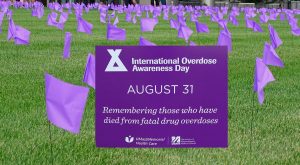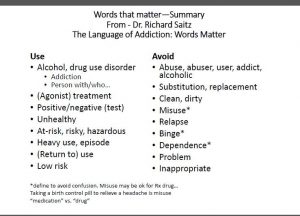Aug
31

Posted by Susan Halpin on August 31st, 2018
Posted in: NLM Resources, Patient Engagement, Public Health, Webinars
Tags: Addiction, opioids, substance use disorder, vocabulary

Who do you think would receive the better medical care… an “abuser” or a person who suffers from “substance use disorder”? Nearly 21 million people in the US have a substance use disorder, however, just ten percent of that number actually get treatment. What keeps people from getting the help they need? The number one reason why people don’t seek the help they need is because of stigma or fear of judgement. One of the first ways to combat the stigma of substance use disorder is to look at the words we use to talk about addiction. “Often when we call people things like ‘addict’ or ‘junkies’ not only are they incredibly judgmental words, but they also kind of pigeonhole someone’s entire being to that one single characteristic’, states Michael Botticelli, the then director of the Office of National Drug Control Policy, as he testified during a Senate Judiciary Committee hearing on July 26, 2016. Research from Dr. John Kelly, from the Harvard-MGH Recovery Research Institute has evidence that the words we use to discuss patients, affects the clinical care they receive. In a study, Dr. Kelly gave trained clinicians identical scenarios about substance use disorder. The only thing he changed was in one scenario he called the person a “substance abuser’ and in the other scenario, ‘a person with substance use disorder’. The result, even from trained clinicians, was that the substance abuser was given a much more punitive response.
The new substance use disorder vocabulary professionals are suggesting we use to discuss addiction is reflective of an updated understanding that addiction is a brain disease, not a moral failing or character flaw. A word like “abuse” implies violation and intent. Those with addiction do make choices, but they have a disease and they need treatment. Our words not only affect the treatment of the individual, our words can also influence policies we create. If you reflect on the history of how we treat people with addiction, it has been with punitive criminal justice responses instead of a strong health response. Therefore, one of the simplest ways to address the stigma of the past is to use language that does not perpetuate negative stereotypes and negative judgement. Using appropriate language can have a direct impact on how people perceive themselves and the care that they receive.
The following information reflects other suggestions for more appropriate language to use when discussing substance use disorder, provided by Dr. Richard Saitz of the Boston University School of Public Health. Because words do matter.

Information for this article was obtained from the following article:
http://www.wbur.org/hereandnow/2017/08/02/language-of-addiction
NNLM NER has a new series of webinars about topics related to Substance Use Disorder.
You can read more about these webinars and register at this link